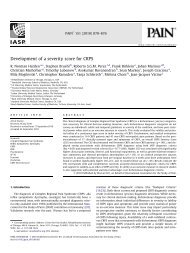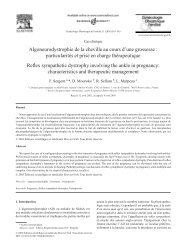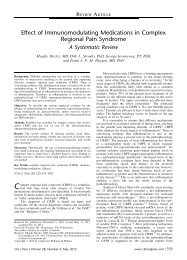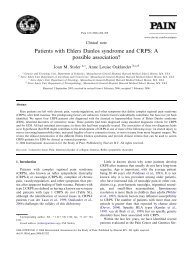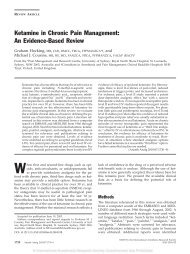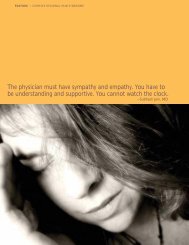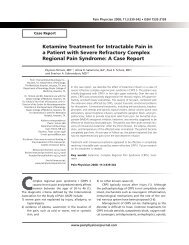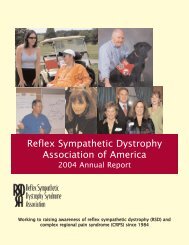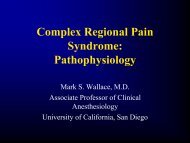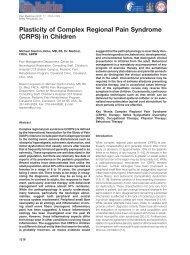printer-friendly version (PDF) - Reflex Sympathetic Dystrophy ...
printer-friendly version (PDF) - Reflex Sympathetic Dystrophy ...
printer-friendly version (PDF) - Reflex Sympathetic Dystrophy ...
Create successful ePaper yourself
Turn your PDF publications into a flip-book with our unique Google optimized e-Paper software.
EXPLORING<br />
PSYCHOSOCIAL<br />
ISSUES IN CRPS<br />
An Interview with Edward C. Covington, MD, Director of the<br />
Chronic Pain Rehabilitation Program at the Cleveland Clinic Foundation<br />
Q. What is the current thinking about the relationship<br />
between the psyche and the soma in CRPS?<br />
DR. COVINGTON A recent search for articles on CRPS, which<br />
are being published at the rate of about 100 per year, showed<br />
that there is still tremendous controversy about the nature<br />
of this disease, and whether it is a psychiatric rather than a<br />
medical condition.<br />
Authors have proposed several theories about how the<br />
psyche might be related to the soma in this syndrome, and<br />
each has varying support. Some believe that CRPS is a psychiatric<br />
illness—a con<strong>version</strong> disorder—that there is something<br />
‘in the head’ that makes it come about. Others see CRPS as a<br />
result of a psychiatric illness or personality disorder that makes<br />
some more likely to get it than others. Some contend that CRPS<br />
causes psychological symptoms or psychiatric illness, while others<br />
think that psychological factors modify the course of CRPS—<br />
making it better or worse. Others think that adjustment and<br />
function in CRPS are determined by psychological factors.<br />
CRPS AND PERSONALITY<br />
Q. Are people with particular personalities<br />
prone to certain diseases?<br />
DR. COVINGTON There was a very old theory that held that different<br />
personality types were vulnerable to different illnesses.<br />
For example, that particular personality types had Crohn’s disease,<br />
others had migraine headaches, and that other types had<br />
CRPS. These ideas were widely taught, but never substantiated,<br />
and had been essentially discredited by the time I was in training<br />
25 years ago. Few people now believe this theory, although<br />
occasionally you’ll hear someone refer, for example, to<br />
migraineurs as compulsive, but this is essentially just folklore.<br />
Q. What about the relationship between personality<br />
and CRPS?<br />
DR. COVINGTON People often mistakenly equate correlation<br />
with causation. Personalities change when people are miserable<br />
and unable to function. So CRPS patients may be irritable,<br />
complaining, or demanding, leading others to conclude that<br />
these traits led to the disease. Another reason people have<br />
thought that personality disorders predisposed to CRPS is<br />
because there are often extreme behavioral changes following a<br />
trivial injury. Thus the inclination is to think, ‘Oh, c’mon, that<br />
couldn’t hurt that bad.’ Psychogenic theories also flourished<br />
because, despite the last twenty years of research, the condition<br />
remains ill-defined. Its pathophysiology is obscure. We don’t<br />
have a good understanding of exactly what CRPS is and why<br />
some people get it and others don’t.<br />
It is common to assume that when no explanation for a<br />
condition can be found, then it must be psychogenic. If doctors<br />
can’t figure it out, perhaps ‘it’s all in the head.’ People with<br />
fibromyalgia and irritable bowel syndrome have been subjected<br />
to the same sort of ideas, and I’m convinced that both are<br />
absolutely organic diseases, as is CRPS.<br />
T H E PA I N P R A C T I T I O N E R | V O L U M E 16 , N U M B E R 1 | 41




